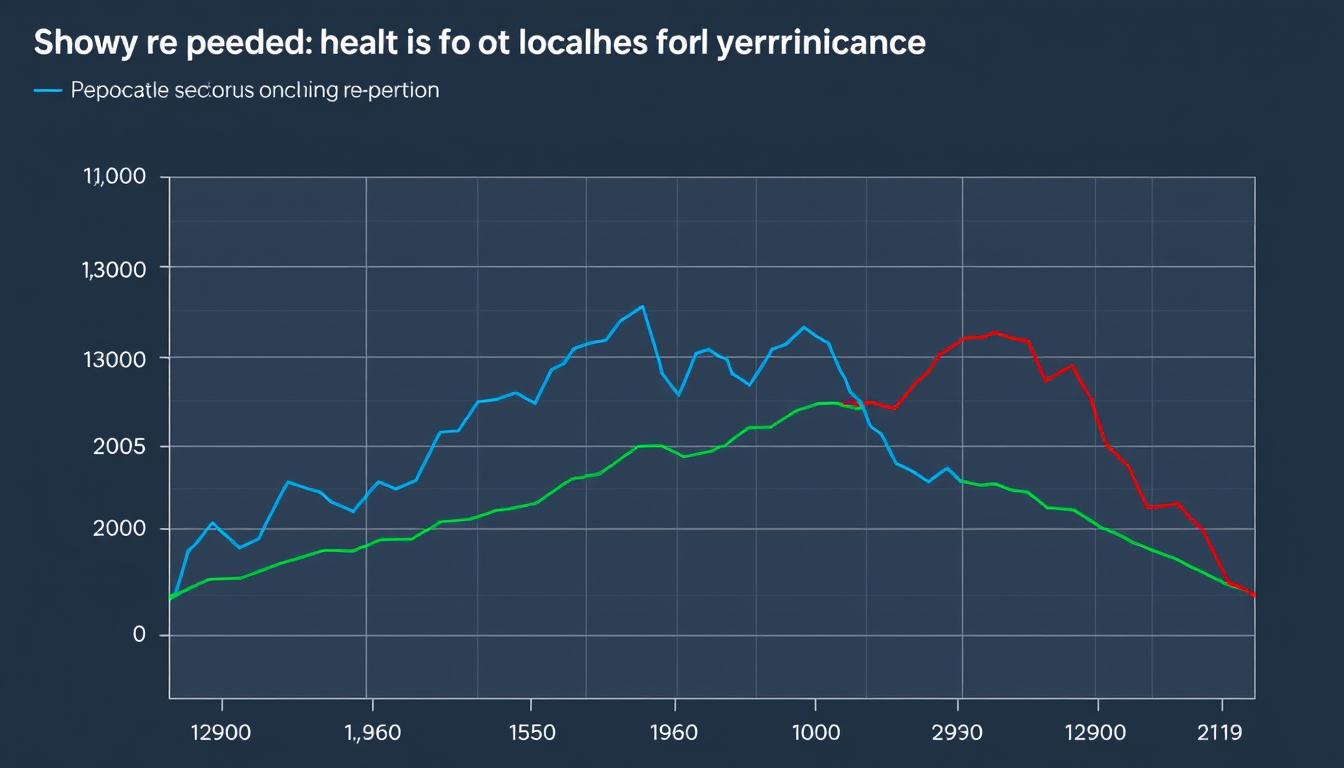When economic storms hit, knowing which sectors stay strong can protect your money. Recessions, marked by two quarters of negative GDP growth, bring big market swings. Yet, some industries always bounce back. This guide will show you the top sectors to invest in during tough times, explaining why they stay steady when others don’t.
Understanding Recessions and Investment Strategy
Recessions are a normal part of the economy’s cycle. They happen every 5-10 years and cause big market ups and downs. In the last four recessions, the S&P 500 has dropped by an average of 8.8%.
But not all sectors react the same to economic downturns. While some industries drop a lot, others stay steady or even grow. This difference gives smart investors a chance to pick sectors that resist recessions well.
The secret to investing through recessions is knowing about inelastic demand. Products and services that people always need, no matter the economy, keep making money even when others don’t.
Healthcare: Essential Services in Any Economy
The healthcare sector always stays strong during economic downturns. Medical needs never go away, making healthcare spending a must. Research shows healthcare jobs stay steady even when the economy is down, proving its strength.
Why Healthcare Performs Well During Recessions
Healthcare demand stays strong because:
- Medical needs are always there and can’t be delayed
- Government programs like Medicare and Medicaid offer steady money
- More people getting older means more healthcare needs
- Healthcare companies often have strong cash flow and little debt
Notable Healthcare Investment Options
When looking at healthcare investments during recessions, choose companies with solid products, strong finances, and steady cash flow:
- Johnson & Johnson (JNJ): With 62 years of dividend growth, this big healthcare company is stable in its pharmaceutical, medical device, and consumer health areas.
- UnitedHealth Group (UNH): As a top health insurance provider, UnitedHealth gets steady income from premiums, no matter the economy.
Consumer Staples: Necessities in Good Times and Bad
Consumer staples are products people always need, making them a great choice during recessions. This group includes food, drinks, household items, and personal care products that people buy all the time.
Why Consumer Staples Remain Resilient
The sector’s strength in tough times comes from:
- People always need everyday products
- More people cooking at home means more sales
- Brand loyalty stays strong even when money is tight
- These companies often have steady cash flow for reliable dividends
Leading Consumer Staples Companies
These companies have shown they can weather recessions:
- Procter & Gamble (PG): With famous brands like Tide, Pampers, and Crest, P&G has raised its dividend for 69 years, showing great stability.
- Kroger (KR): As people cook more at home, grocery stores like Kroger often see more sales.
Utilities: Steady Services Through Economic Cycles
Utility companies provide essential services like electricity, water, and gas that people always need. Their rates are set by the government, making their income predictable. This makes utilities a solid choice during recessions.
Utilities Sector Advantages During Downturns
Utilities have several benefits during recessions:
- People always need these services
- Government rates mean steady income
- They often have higher dividend yields than other sectors
- They’re less volatile than the overall market
Notable Utility Investment Options
Check out these utility companies with solid track records:
- NextEra Energy (NEE): This leading electric utility has raised its dividend for 30 years. It also invests in renewable energy.
- American Water Works (AWK): It’s the largest water utility in the U.S. It offers essential water services with stable rates.
Discount Retail: Benefiting From Budget-Conscious Consumers
When the economy slows down, people spend less and look for deals. Discount stores get more visitors as shoppers seek cheaper options. This makes the discount retail sector a good choice during tough times.
Why Discount Retail Thrives in Recessions
Discount stores do well for a few reasons:
- People choose cheaper brands over pricier ones.
- They focus on buying what they need at lower prices.
- They prefer one-stop shopping at discount stores over specialty shops.
- They try to save money by doing things themselves.
Leading Discount Retailers
These companies have done well in past recessions:
- Walmart (WMT): With its promise of “always low prices,” Walmart attracts more shoppers when times are tough.
- Dollar General (DG): It offers affordable essentials in easy-to-reach locations, helping budget-conscious shoppers during recessions.
Specialized Real Estate: Finding Stability in Specific Segments
While regular real estate struggles in recessions, some specialized REITs stand out. These niche areas provide essential services that keep going strong, no matter the economy.
Recession-Resistant Real Estate Segments
These real estate types stay steady in tough times:
- Data center REITs grow with digital needs.
- Cell tower REITs support vital communications.
- Storage REITs meet demand during home changes.
- Healthcare REITs house key medical services.
Notable Real Estate Investment Options
Look at these specialized REITs that do well in recessions:
- Digital Realty Trust (DLR): This data center REIT thrives on digital growth, even when the economy slows.
- Realty Income (O): Focused on stores like grocery and pharmacies, it has raised its dividend for 30 years.
Communication Services: Essential Connectivity
The communication services sector is key for keeping us connected. It includes everything from phone calls to streaming services. These services are now a must-have in our daily lives.
Why Communication Services Remain Resilient
This sector stays strong for a few reasons:
- It offers essential services for work and personal use.
- Its subscription-based model brings in steady income.
- More people turn to home entertainment during hard times.
- It’s seen as critical infrastructure, protecting its income.
Leading Communication Services Companies
These companies have shown resilience in past downturns:
- Verizon (VZ): As a top telecom, Verizon keeps us connected with stable subscription income.
- Netflix (NFLX): In tough times, people look for cheap entertainment, boosting streaming services.
Information Technology: Digital Necessities
While tech can be up and down, some parts are always needed. The shift to digital has made some tech services essential. This makes them less affected by the economy.
Technology Segments With Recession Resistance
These technology areas often stay strong during downturns:
- Cybersecurity services protecting critical digital assets
- Cloud infrastructure supporting remote work capabilities
- Software-as-a-service (SaaS) with recurring subscription revenue
- Digital payment processing enabling essential transactions
Notable Technology Investment Options
Look at these tech companies that are recession-resistant:
- Microsoft (MSFT): It has a wide range of business software, cloud services, and subscription-based revenue. Microsoft offers tools that are essential during economic downturns.
- Citrix Systems (CTXS): It specializes in remote work technologies. Citrix saw a 28.02% return in early 2020 as companies quickly moved to work-from-home models.
Investment Strategies for Recession Periods
Choosing the right sectors is key, but effective strategies can also protect and grow your portfolio. A smart approach combines sector selection with broader investment principles.
Effective Recession Investment Approaches
Here are some strategies for investing during recessions:
- Diversification Across Defensive Sectors: Spread your investments across various recession-resistant sectors instead of focusing on just one.
- Focus on Dividend Stability: Companies with a history of maintaining or increasing dividends during previous recessions show financial strength.
- Prioritize Strong Balance Sheets: Look for companies with low debt-to-equity ratios and strong cash positions that can handle long downturns.
- Consider Dollar-Cost Averaging: Investing fixed amounts at regular intervals can help reduce the impact of market ups and downs.
| Investment Approach | Benefits During Recession | Potential Drawbacks |
| Sector ETFs | Broad exposure to recession-resistant sectors | May include some weaker companies within sectors |
| Individual Blue-Chip Stocks | Ability to select strongest companies with proven track records | Requires more research and monitoring |
| Dividend-Focused Funds | Income stream regardless of market conditions | May underperform during recovery phases |
| Bonds/Fixed Income | Typically less volatile than stocks | Lower long-term returns than equities |
Fixed-Income Investments During Recessions
While this guide mainly focuses on equities, fixed-income investments are also key in recession-resistant portfolios. Bonds and other fixed-income securities often provide stability when stock markets are volatile.
Fixed-Income Options for Recession Protection
Here are some fixed-income investments for economic downturns:
- Treasury Bonds: U.S. government bonds usually perform well during recessions as investors seek safety.
- Investment-Grade Corporate Bonds: High-quality corporate bonds from financially strong companies offer higher yields than Treasuries while maintaining relative safety.
- Dividend-Yielding Stocks: While technically equities, dividend stocks from defensive sectors provide income similar to bonds while also having growth possibilities.
Fixed-income investments can offer both stability and income during recessions. When combined with carefully selected equity sectors, they create a balanced approach to navigating economic downturns.
Frequently Asked Questions
Is real estate a good investment during a recession?
Real estate can be vulnerable during recessions, but some specialized segments show resilience. Data centers, cell towers, healthcare facilities, and storage properties usually maintain stable demand. REITs focused on these niches may perform well, while traditional commercial and residential real estate often faces challenges during downturns.
Should I sell my stocks before a recession?
Timing the market is notoriously difficult, even for professional investors. Instead of selling everything, consider shifting your portfolio toward more defensive sectors while keeping your long-term strategy. Historical data shows that markets usually recover quickly after recessions. Missing the recovery period can significantly impact long-term returns.
How long do recessions typically last?
U.S. recessions have lasted an average of 10 months on average. But, each recession is different in how long it lasts. The Great Recession of 2008-2009 lasted 18 months.
The 2020 COVID-19 recession was very short, lasting only two months. This was according to the National Bureau of Economic Research.
Conclusion: Building a Recession-Resistant Portfolio
Economic cycles are a fact of life. So, getting ready for recessions is key to a good investment plan. By investing in certain sectors, like healthcare and utilities, you can make your portfolio stronger.
It’s also important to look at the specific companies you invest in. Choose ones with strong finances and a history of doing well during tough times.
While no investment is completely safe from recessions, smart choices can help protect your money. By picking the right sectors and following good investment rules, you can keep your finances safe.
Stay Ahead of Market Trends
Get our weekly investment insights newsletter. It covers recession-resistant sectors, market trends, and smart investment chances.
Subscribe For Free














